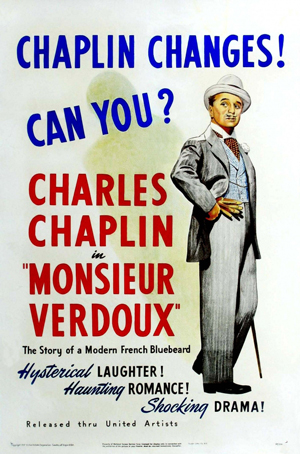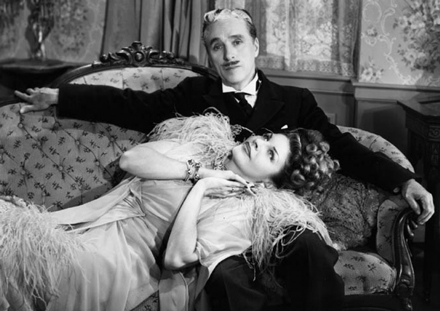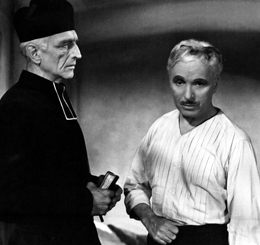
 |
|
|
|
Charles Chaplin was crucified in the American press, hounded by the FBI and finally denied re-entrance to the United States on what was supposed to be a brief overseas trip in 1952. The firestorm of ugly 'politics by denunciation' that came with the beginning of the cold war saw America turn on its most beloved comedian, with all the venom of a lynch mob. It was if Chaplin's The Great Dictator, one of the most politically courageous defenses of Democracy ever made, suddenly branded Chaplin as a dangerous foreign agitator, here to poison the minds of decent Americans. The witch hunters considered too-vocal anti-fascists to be Communists. Already tainted by false publicity on a groundless legal paternity suit, Chaplin followed The Great Dictator with a film that was antithetical to American tastes numbed by the Production Code and puritan hypocrisy. Working from an idea by Orson Welles, Chaplin abandoned his beloved screen character in favor of a Bluebeard-like serial killer. Not only did Monsieur Verdoux not fit in with sentimental pabulum like The Bells of St. Mary's, it dared confront America with genuine "dangerous ideas." Thumbing its nose at religion and telling its audience that they are all part of a giant capitalist murder machine, Verdoux became the picture that nobody saw, but that everybody hated. 
Chaplin breaks entirely with the Little Tramp in Monsieur Verdoux, replacing him with a prissy bourgeois everyman murderer. "Chaplin Changes -- Can You?" was one of the film's taglines in a desperate attempt to reach the public. The film is not a big laugh getter, and in fact much of its comedy is at odds with the flow of Chaplin's cold-blooded story. At the end of The Great Dictator Chaplin broke the fourth wall to directly address the audience with a plea for human kindness in the wake of the slaughter of WW2. Here Chaplin starts with the message that Human Society is corrupt beyond repair, and that the violence and meanness of wars is present in our competitive daily struggle: we're all guilty. Henri Verdoux (Chaplin) lost his fortune in the stock market crash and to make ends meet has become a Merry Widow killer. With his wife (Mady Correll) and child safely installed in a country villa, he marries rich women in distant cities and then murders them. Two prospective victims eventually get under his skin. Annabella Bonheur (Martha Raye) is an awkward heiress who turns out to be harder to kill than Rasputin. "The Girl" (Marilyn Nash) is a lost soul upon whom Verdoux foolishly takes pity. Is Monsieur Verdoux funny? That depends. Although occasional scenes frame physical gags reminiscent of Chaplin's Little Tramp, most of the humor is ironic. Verdoux's overstated good manners are contrasted with his murderous intentions. Prospective victims invariably say things that allude to their impending fate. The show begins with a now-famous shot of Verdoux pruning his rose garden while his latest wife is cooking in the incinerator. This leads to a neighbor wondering when she will be able to hang her wash out to dry -- a sly allusion to the crematoria at Auschwitz. Verdoux uses various ruses to hide his real activities from deliverymen, relatives and the police. The film's wickedly seriocomic edge underscores the total ruthlessness of the Verdoux character. He adroitly eliminates a detective that has singlehandedly tracked him down. But he's eventually tripped up by bad luck and the personalities of the women he's attempting to kill. Broad comedienne Martha Raye gives the performance of her career playing opposite Chaplin. Sort of an updated version of the oversized women Charlie tormented in his silent shorts, Raye's timing and attitude are exactly what the film needs. The joke is that she's un-killable, simply because she's unpredictable. A mix-up with some poison and a bottle of hair dye makes Verdoux think that he's poisoned himself. Instead of pushing up daisies per his plan, Raye is alive and kicking when Verdoux is set to marry another foolish widow he's been pursuing for the entire course of the picture. When Raye shows up at the wedding ceremony, everything falls apart. 
Throughout the picture Chaplin has presented the horrid monster Verdoux as outwardly genteel and cultured. Henri keeps his crippled wife and son ignorant of his real business activities. They live in a handsome rural villa, even though the meek wife says that she'd be happy in a small room. Verdoux coldly converts his conquests into ready cash, and trips himself up only when he permits himself human feelings. Seeking a test subject for a new poison he's concocted, Henri lures a penniless woman (Marilyn Nash) to his room. In the cast list she's referred to only as "The Girl", the same way Chaplin identified the idealized leading ladies of his silent pictures. When The Girl explains that she's just come from prison, and that she believes existence to be meaningless, Verdoux spares her and gives her money. But he runs into her twice more. The first time he denies their previous association, and rudely tells her to go about her business. The second time occurs late in the picture, when Verdoux has lost everything and is living in poverty. He accepts The Girl's charity; she's married an arms manufacturer and is now quite wealthy. Verdoux opines that maybe he chose the wrong business after all. (spoilers alert)At this point in the picture 1947 audiences surely had no clue what would happen next. In his statements at his trial and while waiting for his appointment with the guillotine, Henri Verdoux becomes the spokesman for Chaplin's chillingly logical thesis. He claims that his murderous activities were just 'business', and refers to himself as an amateur killer. Why should he be singled out when the business of the world is mass murder in war? Why aren't the makers of weapons of mass murder on trial? Although Chaplin's enemies in the press barely referenced Monsieur Verdoux, there's no denying that Chaplin is indicting capitalism as a murder-for-profit enterprise. Chaplin then continues to a blistering atheistic comment. Verdoux offhandedly dismisses the conventional relationship between God and Man. "May God have mercy on your soul," says the priest, to which Verdoux responds, "Why not? It belongs to him." After a glass of Rum, which he has never tasted, Verdoux takes his last walk -- and drops the proud posture he's shown throughout the film. With his shoulders hunched, taking little steps, he trudges to his fate just like the Little Tramp. Chaplin is saying that the world has become such a hypocritical charnel house that there's no longer room for innocence and sentiment. Monsieur Verdoux is only intermittently successful as a black comedy, as it cheats. The only woman he's actually shown killing is an unlikeable nag; his other two targets are amusing and lovable, and escape. But as a philosophical statement playing off the universally beloved Little Tramp character, the film's messages cut like a knife: in a world that values only money, human life is just another commodity. Idea source Orson Welles would later play a similar "charming" monster in Carol Reed's The Third Man. His black market pirate is happy to profit from the killing of children, and compares people to ants that can be converted into dollars. 
Chaplin resisted technical changes in his sound-era films, but in Monsieur Verdoux he updates his directing style, dropping some of the simple pictorialism that served him since 1915. Some sets are designed for an emotional impact not centered on Chaplin's comic antics. The camera moves more often, and several very fluid shots use depth to make a point. One of the disc's featurettes points out a moving shot that contrasts the stylized romanticism of a pair of nightclub dancers, with the miserable Verdoux sitting with The Girl. Chaplin joins Verdoux's many trips back and forth across France with the same connective image, a shot of locomotive wheels taking Verdoux to his next appointment. Interestingly, the last few scenes are still linked by the train wheel motif, even when no travel is involved. The suggestion may be that modern killing is part of the mechanized 'engine of progress.' Criterion's Blu-ray of Monsieur Verdoux is immediately preferable to the old Warners DVD from 2004, which was converted from PAL and played 4% faster than it should, cutting the running time by a full five minutes. Chaplin's careful timing and all of the voices now seem correct again. The image is very good, with only a few light scratches appearing from time to time. The extras begin with Chaplin Today, the MK2 docu from the old Warners' disc. Author Bernard Eisenschitz and French director Claude Chabrol make a case for Monsieur Verdoux as a superior murder thriller. The film clips used run at PAL speed, which seems very fast after watching the picture at the proper frame rate. Even more compelling is Charlie Chaplin and the American Press, an overview of the biased coverage given Chaplin's legal scandals. It covers the hostile reaction to Chaplin's supposedly pro-Soviet philosophy and the storm of hateful publicity that surrounded Verdoux. An interesting audio interview with Marilyn Nash is included, along with some radio advertisements and trailers. The insert booklet contains an essay by Ignatiy Vishnevetsky, a defense of the film by André Bazin and Chaplin's own statement about the movie from the time of its release. I've seen Monsieur Verdoux with audiences that laughed consistently, although to me it plays as a grim social horror movie. James Agee's spirited articles still make the best reading on Monsieur Verdoux. His attempt to personally defend Chaplin at the disastrous Verdoux press conference ("begin the butchery") is covered in the fascinating book Chaplin and Agee: the Untold Story of The Tramp, The Writer and The Lost Screenplay by John Wranovics. I once accessed an L.A. newspaper from 1947 to look at what was playing in town then -- films like Captain from Castile. In the space of just a few pages there were three venomous editorials against Chaplin. Hollywood gossip columnists and others practically called him Satan and encouraged his immediate deportation. The same mad dogs screaming for Chaplin's hide would later brand him a paranoid for "imagining" that the U.S. was out to get him.
On a scale of Excellent, Good, Fair, and Poor,
Monsieur Verdoux Blu-ray rates:
Reviews on the Savant main site have additional credits information and are often updated and annotated with footnotes, reader input and graphics.
Review Staff | About DVD Talk | Newsletter Subscribe | Join DVD Talk Forum |
| ||||||||||||||||||